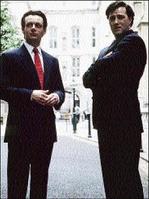
Michael Sheen (left) and David Morrissey star in 'The Deal' Thursday night at 8 on HBO.Helen Mirren dominated the major acting awards season last year with her astonishing performance in The Queen. Most critics agree, however, that Mirren's performance was strongly abetted by Michael Sheen's polished and quietly dazzling portrayal of former British Prime Minister Tony Blair.
Now, HBO gives United States audiences a welcome opportunity to catch Sheen's first foray into the same role as the 2003 British TV film The Deal makes its American television debut on Thursday.
In addition to Sheen, The Deal creative team also includes director Stephen Frears, screenwriter Peter Morgan and executive producer Andy Harries, all of whom subsequently worked on The Queen as well, in a dramatisation of an alleged secret agreement between Blair and fellow Labour Party member Gordon Brown (David Morrissey, State of Play), who became prime minister himself in June when Blair stepped down.
The Deal, which also co-stars Elizabeth Berrington as Blair's wife, Cherie, won a BAFTA Award (the British Emmy) and stirred up a significant amount of controversy with its unprecedented depiction of real-life British political figures who were still dominating front-page headlines even as this TV movie was being made.
love story
"It was first presented to me as: 'Stephen Frears is making a love story about Tony Blair and Gordon Brown,' " Sheen recalls by phone from Hollywood, where he is filming Frost/Nixon, also written by Morgan.
"My first thought was, 'What on Earth is that going to be about?' When I met with Stephen and talked about it and read it, I was just really excited to work with him. It was only afterwards when I started to get worried, because there never had been anything like that done in Britain before.
"(We didn't know) whether an audience would accept myself and David Morrissey as these characters, who - especially in the case of Blair - were so familiar to the British people, given that it wasn't a satire or comedy. We had no idea whether it would work, so we were all very, very worried about getting the right tone and finding the right notes, because there were no reference points before that."
The Deal charts the rise of Blair and Brown starting in 1983, when the two shared a tiny, windowless office as members of the House of Commons. Brown, a taciturn Scot, had more political experience and viewed Blair, played with puppyish, disarming eagerness by Sheen, as a protégé.
As the years passed, however, the charismatic Blair began to build his own power base and, when Labour Party leader (and Brown's mentor) John Smith died in 1994, Brown swallowed his pride and yielded the party leadership to his longtime friend Blair after the two men dined at a London restaurant called Granita.
What happened at that dinner? What, if anything, did Blair promise Brown in exchange for stepping aside? Was Blair acting out of ruthless political selfishness or a genuine conviction that he, not Brown, would be better for their party?
Morgan's teleplay is rife with clever yet ambiguous lines that can be interpreted either way, depending on your own perception of Blair and Brown. Early on in their conjoined careers, the two men are discussing their futures, and Blair points out that only one of them will be able to go all the way to the party leadership. Brown asks him bluntly which of them he means.
right man in the right place
"The one who has Labour leader written all over him," Blair replies with a bland smile.
"Here is someone who was the right man in the right place at the right time," Sheen says. "That was what I was interested in exploring. Blair always can justify what he does as being the best thing for the party, but is that what he really believes, or is he being opportunistic? The question is how ambitious is this man, and how much is he really serving the needs of his party? How aware is he of his ambition and opportunism?"
After its U.K. premiere, both Blair's detractors and his supporters took issue with The Deal, the former complaining that the TV movie let Blair off the hook, the latter that it was a hatchet job.
naive, innocent and foolish
"When you're playing a political character, people expect you to have an agenda, because everybody else has an agenda or a strong opinion," Sheen says. "As an actor, you have to try not to have an agenda. Obviously, you have to make choices when you are telling a particular story, but to me it was the ambiguity of the character that I liked the most: that on the one hand, he seems naive, innocent and foolish, but on the other hand he's very manipulative and ambitious and possibly very duplicitous. You're never quite sure where you are with him.
"With any character, you build a very peculiar connection with that character, because you are both them and not them at the same time. And that becomes much more complicated with a real-life character if they are still alive. Tony Blair was still prime minister when I was playing him. I have my own opinions about his politics, but I have to keep those separate to some extent. It makes for a very confusing relationship to your prime minister!"
For the HBO telecast, a written epilogue is being expanded to cover Blair and Brown's recent reversal of political fortunes. Meanwhile, Morgan has begun work on a third film to star Sheen as Tony Blair, this time focusing on Blair's relationship with Presidents Bill Clinton and George W. Bush.
- John Crook, Zap2it

